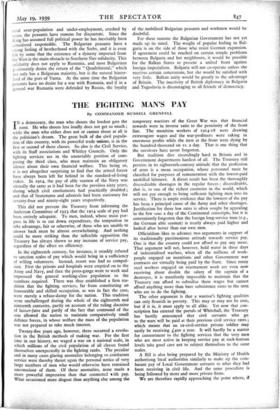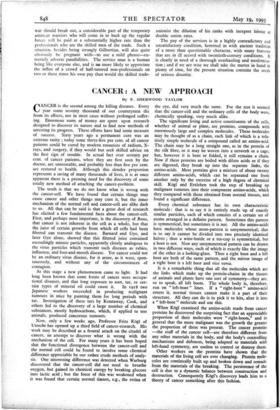THE FIGHTING MAN'S PAY
By COMMANDER • RUSSELL GRENFELL
IN a democracy, the man who shouts the loudest gets the most. He who shouts less loudly does not get so much ; while the man who either does not or cannot shout at all is the politician's dream. The great bulk of the civil popula- tion of this country, with its powerful trade unions, is in the first or second of these classes. So also is the Civil Service, with its Staff associations and Whitley Councils. Only the fighting services are in the unenviable position of com- posing the third class, who must maintain an obligatory silence about their own financial welfare. This being so, it is not altogether surprising to find that the armed forces have always been left far behind in the standard-of-living stakes. In 1914, the pay of able seamen of the Navy was virtually the same as it had been for the previous sixty years, during which civil emoluments had practically doubled ; and that of lieutenants and admirals had been stationary for seventy-four and ninety-eight years respectively.
This did not prevent the Treasury from informing the Anderson Committee of 1923 that the 1914 scale of pay had been entirely adequate. To men, indeed, whose main pur- pose in life is to cut down expenditure, the temptation to take advantage, fair or otherwise, of those who are unable to answer back must be almost overwhelming. And nothing could be more striking than the inflexible opposition the Treasury has alilvays shown to any increase of service pay, regardless of the' effect on efficiency.
In the eighteenth century, for instance, it steadily refused to sanction scales of pay which would bring in a sufficiency of willing volunteers. Instead, resort was had to compul- sion. First the prisons and hospitals were emptied on to the Army and Navy, and then the press-gangs went to work and impressed the general working-class population to the numbers required. There was thus established a firm tra- dition that the fighting services, far from constituting an honourable and skilled occupation, as was in fact the case, were merely a refuse-dump for the nation. This tradition went unchallenged during the whole of the eighteenth and ninteenth centuries, partly on account of the ruling doctrine of laisser-faire and partly of the fact that command of the seas allowed the nation to maintain comparatively small defence forces, in whose welfare the mass of the population was not prepared to take much interest.
Twenty-five years ago, however, there occurred a revolu- tion in the British methods of making war. For the first time in our history, we waged a war on a national scale, in which millions of the civil population of all classes found themselves unexpectedly in the fighting ranks. The peculiar and in many cases glaring anomalies belonging to combatant service were thereby thrust upon the personal notice of very large numbers of men who would otherwise have remained unconscious of them. Of these anomalies, none made a more powerful impression than that connected vith pay. What occasioned more disgust than anything else among the temporary warriors of the Great War was that financial rewards were in inverse ratio to the proximity of the front line. The munition workers of 1914-I8 were drawing extravagant wages and the war-profiteers were raking in enormous profits while the men at the front were dying by the hundred-thousand on Is. a day. That is one thing that the survivors have never forgotten.
But tradition dies exceedingly hard in Britain and in Government departments hardest of all. The Treasury still persists in its eighteenth-century attitude that the profession of arms is a mean occupation, whose personnel must be classified for purposes of remuneration with the lowest-paid unskilled labourer. A direct result has been the thoroughly discreditable shortages in the regular forces ; discreditable, that is, to one of the richest countries in the world, which will not pay enough to bring sufficient fighting men into its service. There is ample evidence that the lowness of the pay has been a principal cause of the Army and other shortages. Justification for these low rates is often sought by appealing to the few sous a day of the Continental conscripts, but it is conveniently forgotten that the foreign long-service man (e.g., the German able seaman) is nearly always paid higher and looked after better than our own men.
Officialdom likes to advance two arguments in support of its traditionally parsimonious attitude towards service pay. One is that the country could not afford to pay any more. That argument will not, however, hold water in these days of industrialised warfare, when all the millions of work- people engaged on munitions and other Government war contracts are virtually being paid by the State. Since many steel workers engaged on rearmament work are even now receiving about double the salary of the captain of a destroyer, it is manifestly impossible to maintain that the Treasury can afford to subsidise these wages but cannot afford anything more than bare subsistence rates to the men who are to do the fighting.
The other argument is that a warrior's fighting qualities can only flourish in poverty. This may or may not be true, but if it is, it must apply to all alike. Yet now that con- scription has entered the portals of Whitehall, the Treasury has hastily announced that civil servants who go to the wars will be paid at their previous civil service rates ; which means that an ex-civil-service private soldier may easily be receiving L400 a year. It will hardly be a matter for contentment to the fighting services that the very men who are most active in keeping service pay at rock-bottom levels take good care not to subject themselves to the same scales.
A Bill is also being prepared by the Ministry of Health authorising local authorities similarly to make up the com- batant pay of Local Goirernment servants to what they had been receiving in civil life. And the same procedure is being followed by more and more private firms.
We are therefore rapidly approaching the point where, if war should break out, a considerable part of the temporary amatLur warriors who will come in to back up the regular forces will be paid at a substantially higher rate than the professionals who are the skilled men of the trade. Such a situation, bcsides being strongly Gilbertian, will also quite obviously be pregnant with—to use a mild phrase—ex- tremely adverse possibilities. The service man is a human being like everyone else, and is no more likely to appreciate the influx of a crowd of half-tutored non-professionals on two or three times his own pay than would the skilled trade- unionist the dilution of his ranks with inexpert labour at double union rates.
The pay of the services is in a highly contradictory and unsatisfactory condition, hemmed in with ancient tradition of a more than questionable character, with many features that are in ill accord with twentieth-century conditions. It is clearly in need of a thorough overhauling and modernisa- tion; and if we are wise we shall take the matter in hand in plenty of time, for the present situation contains the seeds of serious disunity.



















































 Previous page
Previous page